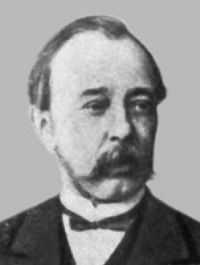Difference between revisions of "Dmitry Andreyevich Tolstoy"
m (link) |
(succession) |
||
| Line 16: | Line 16: | ||
==Reference== | ==Reference== | ||
<references/> | <references/> | ||
| + | |||
| + | {{start box}} | ||
| + | {{succession| | ||
| + | before=Alexei Petrovich Akhmatov| | ||
| + | title=[[Ober-Procurator]]| | ||
| + | years= 1865-1880| | ||
| + | after=[[Constantine Petrovich Pobedonostsev|Constantine Pobedonostsev]]}} | ||
| + | {{end box}} | ||
==Source== | ==Source== | ||
Revision as of 00:49, September 17, 2009
Count Dmitry Andreyevich Tolstoy, (Russian: Дми́трий Андре́евич Толсто́й), was a Russian statesman and Ober-Procurator from 1865 to 1880 of the Apostolic Governing Synod, the government governing agency over the Church of Russia.
Contents
Life
Dmitry Andreyevich was born on March 13, 1823 into the noble Tolstoy family. He graduated in 1843 from the Lyceum at Tsarskoye Selo and entered government service. In 1853, he was assigned to a management position in the Ministry of the Navy. In 1865, Dmitri Andreyevich was named to the position of Ober Procurator of the Apostolic Governing Synod, overseeing the administration of the Russian Orthodox Church. He remained in this position until 1880.
In 1866, he was assigned the post of Minister of National Enlightenment (Education), holding this office simultaneously with that as Ober Procurator. He remained in this position until 1880. In 1882, Dmitry Andreyevich became the Minister of Internal Affairs and the Chief of the Gendarmerie, a post that he held until his death on May 7, 1889.
Policies
Dmitry Andreyevich was one of the pillars of conservatism and reaction in the Russian Imperial government of the late nineteenth century. He was a supporter of strong authority. His activities were aimed at supporting the nobility, regulating the lives of the peasants, and maintaining his administrative influence over subordinate authorities. He is also remembered for his Russification program in Poland and Ukraine.
As Ober Procurator, Dmitry Andreyevich considered the clergy of the Russian church as subordinate to that of the Imperial government. [1] Acting under this principle, he openly ignored opinions of the Church hierarchs in maintaining his administrative positions. To keep the bishops subordinated, he moved the bishops between their dioceses every three to four years thus disrupting their ability to form coordinated efforts.
In the field of clergy education, Dmitry Andreyevich succeeded in improving the educational level in the theological school system, a precursor of further improvements made by Constantine Petrovich Pobedonostsev, Dmitry Andreyevich's successor as ober procurator.
Reference
| Dmitry Andreyevich Tolstoy | ||
|---|---|---|
| Preceded by: Alexei Petrovich Akhmatov |
Ober-Procurator 1865-1880 |
Succeeded by: Constantine Pobedonostsev |
